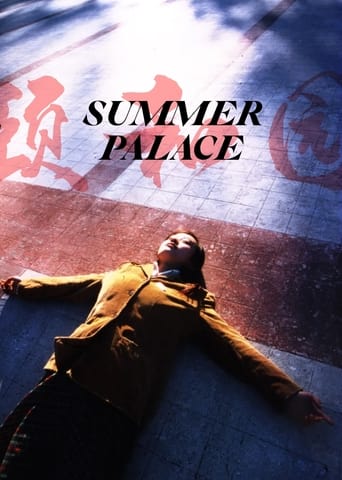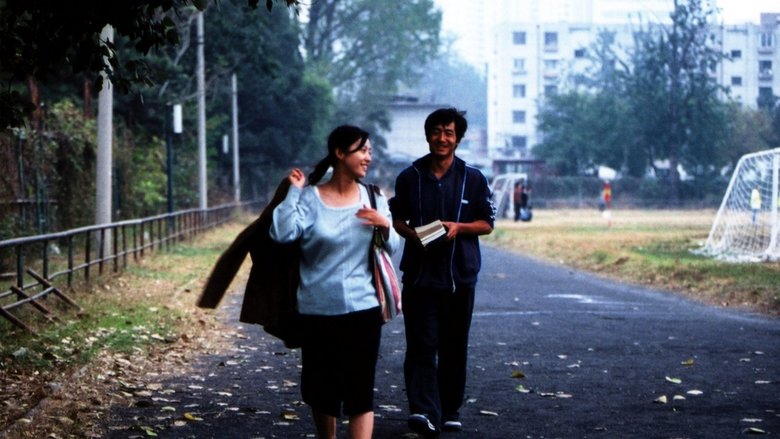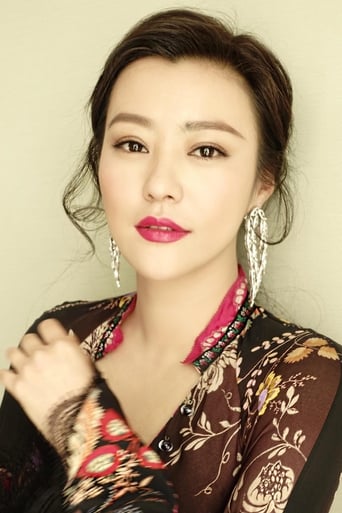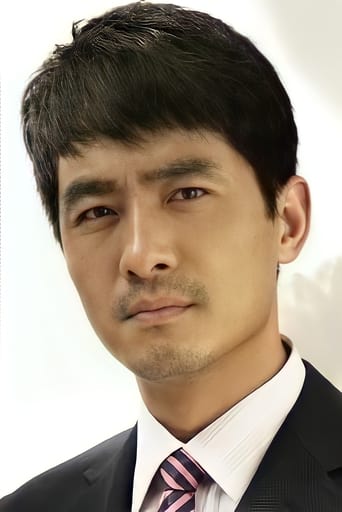

Summer Palace (2006)
Country girl Yu Hong leaves her village, her family and her lover to study in Beijing. At university, she discovers an intense world of sexual freedom and forbidden pleasure. Enraptured, compulsive, she falls madly in love with fellow student Zhou Wei. Driven by obsessive passions they can neither understand nor control, their relationship becomes one of dangerous games - betrayals, recriminations, provocations - as all around them, their fellow students begin to demonstrate, demanding democracy and freedom.
Watch Trailer
Cast


Reviews
I have to say that I am genuinely skeptical about people who hail this movie as a "masterpiece", because I simply cannot believe that anyone could overlook the many flaws of the movie - especially concerning the aspects of story-telling and entertainment. I can already see how some people who read this cry out: "This is not supposed to be about entertainment, it's about emotions, a mirror of the time and place, it's thought-provoking, beautifully shot, if you don't like it, you should go back to watching the Fast and the Furious", etc.! Well, fact is: a good movie SHOULD be entertaining! If it fails on this level, then it fails as a whole, no matter how beautifully shot, etc. it is. It is right, of course, to say that too many movies are made solely for entertainment purposes. Many movies try to feed us basic ingredients, but fail to spice them up - and those movies fail, too. Summer Palace, on the other hand, delivers lots of spices in terms of artistic craftsmanship - but no substance. I don't think the story it tells is worth telling for the most part.The movie does depict an interesting time and place; and it is nicely shot. And it probably took some courage to make because it features the demonstrations at Tian An Men Square in June 1989, which is still kind of a taboo today in China (don't get your hopes up, though: you just see a crowd demonstrating and throwing bricks at a burning truck for a few minutes; the political background is never mentioned or even hinted at, nor does anything else happen, besides the main characters being scared and confused and running around inside the student dormitory looking for each other). The characters, however, experience a remarkably small amount of hardship (or happiness, or even anything), considering the times they live in. Yet they all seem to break in their own ways under the things they endure. I think a big problem i have with this movie is the fact that it takes itself so very seriously and the characters feel sorry for themselves all the time because of how tough they have it. And since they don't attempt to do anything about their oh-so-tough problems, it is pretty hard to feel sympathetic for them.We get to see good acting for characters that are barely worth the actors' while. They have to deliver pseudo-meaning-bearing lines like "i want to break up with you because i cannot break apart from you" followed by two people staring at each other or thinking for a veeery looong time without saying a word. Another recurring thing (at least once every fifteen minutes) is people having sex and bursting out in tears after wards because they are emotionally overwhelmed or unfulfilled. The sex scenes get really old really quick, by the way. And so does the crying.Summer Palace seems to me like a movie made for an audience that generally enjoys independent movies with high artistic value and low commercial motivation. It is made for an audience that likes to find subtle messages where there maybe really aren't any. And it is made for an audience that doesn't mind watching an unimpressive story unfold over two-and-a-half hours. It's the kind of movie you're bound to see at some point when you attend a film-festival.
Summer Palace is a politically charged drama from director Lou Ye.The movie features Hao Lei and Guo Xiaodong.The screenplay by Lou Ye, Feng Mei and Ma Yingli tells the story of Chinese political upheaval through the eyes of protagonist Yu Hong, who moves from her rural community to embrace life in Beijing. Spanning nearly 20 years, the film elucidates the mindset of the Chinese revolutionary youth during the 1980's and into the new millennium through its narration by Hong, who reads diary excerpts to set scenes.Yu Hong is a beautiful 17-year-old girl who is soon to leave the small border town where she was born and raised to attend college at Beijing University. Shortly before Yu Hong leaves for school, she gives her virginity to her longtime boyfriend, Xiao, and pledges to remain faithful to him. At Beijing University, Yu Hong makes friends with Li Ti,another girl dealing with a long-distance relationship, and meets Zhou Wei, a handsome student who soon steals her heart. Yu Hong leaves her relationship with Xiao behind to commit herself to Zhou Wei, and she's swept up by her feelings for him as they embrace the new social and economic freedoms which are being felt on campus. The empowerment felt by the students in Beijing comes to a head during a series of demonstrations in Tiananmen Square; the protests have tragic consequences, and the excitement of new possibilities gives way to a feeling of defeat. Yu Hong and Zhou Wei are separated and the heavy hand of the state is brought to bear on the rebellious students.The movie suffers from excessive length and inconsistent pacing.Also,one who does not speak the movie's language needs full concentration to follow what's happening in the plot and to get the message that it is trying to impart.But nevertheless,it manages to be a brilliant and excellent film encapsulates an important moment in Chinese history and will especially enlighten viewers to the nuances of people struggling for freedom.Aside from that,we get to see the coming-of-age and maturation of Hong as she gets exposed to the her world and the changes she undergoes in response to it.
In the late 1980's, an inexperienced young woman named Yu Hong leaves her hometown and boyfriend in the provinces to attend Beijing University. Almost immediately, she falls into a passionate love/hate relationship with a fellow student at the school. This torrid affair plays out partly against the backdrop of the student protests and subsequent massacre that occurred in Tiananmen Square in the spring of 1989. (The movie also takes place briefly in Germany, the other part of the world where significant social change was occurring in 1989)."Summer Palace" plays almost like the autopsy of a romantic obsession, attempting to get at the root of why we love in the way that we do. A novice at true love, Yu Hong understands neither her undying passion for Zhou Wei nor her seemingly incessant need to keep sabotaging their relationship. The closest she can come to grasping this paradox is when she says to Zhou Wei: "I want to break up because I can't leave you." Love is seen almost as a form of mental illness in this film - as a debilitating, all-consuming condition that one is powerless to control or "cure" but which, if left unchecked, can become the single dominant force in a person's life (we rarely see Yu Hong studying, let alone going to class). One can attempt to fill the void with other loves, but the heart always comes back to the same place."Summer Palace" is long and occasionally repetitious and the political aspects aren't as effectively integrated into the story as they perhaps might have been, but the movie is beautifully acted by Lei Hao and Xiaodong Guo, among others, and features incisive and sensitive direction by Ye Lou (who, along with Feng Mei and Ma Yingli, co-authored the screenplay). This is a largely impressionistic film, concentrating more on mood, imagery and emotions than on narrative. The last hour of the film - so filled with longing and regret as the characters age and attempt to come to terms with the special thing they have lost - is particularly lyrical and heartbreaking and will haunt you long after the movie is over.All told, "Summer Palace" is an intelligent and moving rumination on that mysterious force we call love.
Continuing my weekend of R21 movies, given that almost every screen in Singapore is showing Spider-Man 3 at the moment, and gives a clear indication on how the other blockbusters in the next 2 months will be treated as well. The Passion was a disappointment, and Summer Palace, somehow didn't live up to its hype, probably drawing curious audiences by the banning of its director Lou Ye from making films in the Mainland for the next 5 years, because he had failed to obtain official permission before screening Summer Palace overseas.In any case, the same old marketing gimmick was to hype that this as the most erotic movie from China, and naturally drew audiences in like bees to honey. I've long classified broadly that movies of the romance genre can usually be grouped into the romantic comedies which Hollywood does well enough, and the romantic tragedies which try to bring out those tears. I've forgotten one more group, so add this to the broad classification now - those that want to titillate. Summer Palace attempts to explore relationships from its leads against the historical backdrop of change in China, but falls flat and seemed to prefer to focus on humping.And even that it degenerates itself into soft porn territory, but at least soft porns are being honest about it. The story is neither a tragedy, or comedy, just plain boring drama infused with plenty of sex, which becomes meaningless, and mechanical after a while with repeated actions that drills down to lack of skills in bed. Both the action and the characters lack the emotional core that grabs the attention of the audience and engage some cerebral on why they are doing what they're doing.Yu Hong (Lei Hao) is a village girl staying near the border of China and North Korea, and qualified for Beijing University in the late 80s. Leaving behind her shopkeeper father and a postal service boyfriend who deflowered her in the middle of a road late one night, she goes to the big city, but inside is quite unhappy about it. You know, she's one of those girls with huge emotional baggage problems that nobody, including herself, understands why.Friendship comes in the form of fellow hostel mate Li Ti (Ling Hu), who introduces her to Zhou Wei (Guo Xiaodong) at one of those jam and hop sessions, and thereafter they become sex partners trying to heat up the screen. It becomes love found, love lost, making love, love lost, love found, you get the idea. We have confused characters who do not know what to do with each other, and to make things worse, they're promiscuous too, making everything quite frivolous in their quest to satisfy their lust for sex. Even the direction and story became schizophrenic, and with the lack of skill, breezes through events like the Tiananmen Incident, and the fall of Communism with the collapse of the Berlin Wall, Gorbachev's resignation, Yeltsin's ascension to power, and the likes, with just archived images, and subtitles indicating the event and the year. It's cheap, lazy film-making. Before you know it, it's down to the last hour where the characters have grown up, and apart in different countries.There's a general feeling of lost, and if that's the filmmakers' intent, they have succeeded. Perhaps the best part is the reunion, where I thought is the only time when it's realistic with the feeling of helplessness and being tongue tied when meeting up with a loved one after donkey years - things are never the same again, and could never be the same anymore, and do you wish to hold onto the past, or move on to your own future?Despite the pretentious plot and characters, the movie does feature an excellent eclectic soundtrack, and there thankfully helped keep everyone awake. Otherwise it's as hokey as the inscription on the tombstone - unless it's a mega tombstone, I don't see how those words could have been inscribed on it without running out of space.




